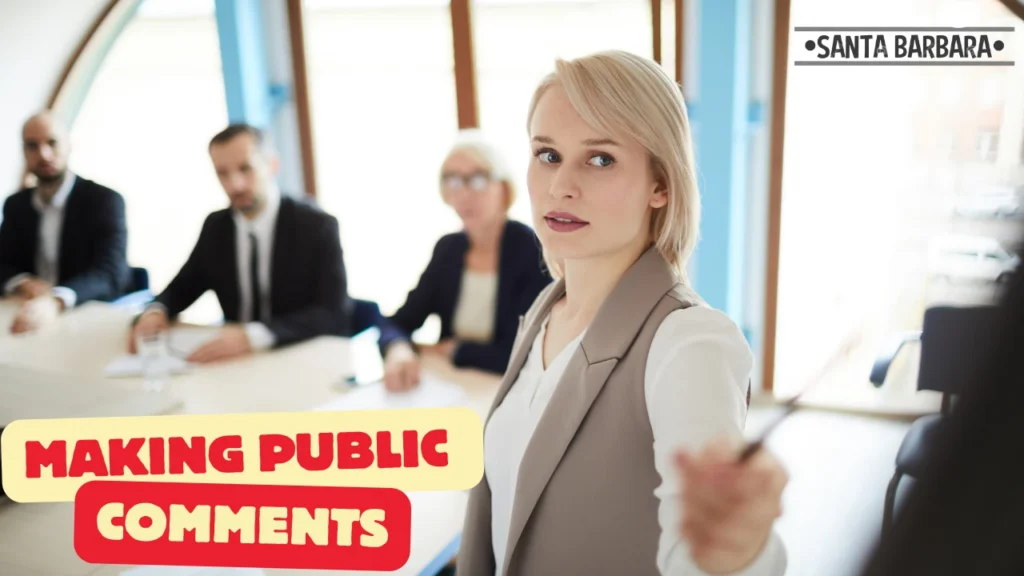Santa Barbara County Board Meetings.Public participation is the foundation of a healthy democracy. In Santa Barbara County, residents have a valuable opportunity to influence decision making through public comments at Board of Supervisors meetings.
Whether it is about housing, environmental issues, public safety, or community development, every voice matters. This blog will provide a comprehensive guide on how to make public comments at Santa Barbara County Board meetings, along with tips and best practices to maximize your impact.
Santa Barbara County Board Meetings: How to Make Public Comments-Overview
| Article on | Santa Barbara County Board Meetings: How to Make Public Comments |
| Review Agenda | Check the county website for posted agenda items. |
| Sign Up | Register early in person or online to speak. |
| Prepare | Draft concise comments (2–3 minutes). |
| Speak | Deliver respectfully and clearly during your turn. |
| Follow Up | Email your supervisor to reinforce your message. |
Understanding the Role of the Santa Barbara County Board of Supervisors
The Santa Barbara County Board of Supervisors is the primary governing body of the county. It is composed of five elected supervisors who represent different districts within the county. Their responsibilities include setting policies, approving budgets, and making decisions on matters ranging from land use and housing to social services and environmental protections.

Why Public Comments Matter
Public comments serve as a direct communication channel between residents and their elected officials. They allow community members to:
- Express support or opposition to proposed policies
- Share personal experiences and local knowledge
- Highlight overlooked issues
- Suggest alternatives or improvements
When and Where to Make Public Comments
Santa Barbara County Board of Supervisors meetings are typically held at the County Administration Building in Santa Barbara or in Santa Maria, depending on the schedule. The agenda is posted in advance on the county’s official website, usually at least 72 hours before the meeting. Public comments are accepted during two main periods are as given below:
- General Public Comment Period: This is reserved for issues not on the agenda but within the Board’s jurisdiction.
- Agenda Item Comment Period: When specific agenda items are discussed, the public is invited to speak on those topics before the supervisors deliberate and vote.
Step-by-Step Guide to Making a Public Comment
1. Review the Agenda
Before the meeting, check the posted agenda on the Santa Barbara County website. Identify whether your topic is covered under a specific item or if it belongs in the general public comment section.
2. Register or Sign Up
If you plan to attend in person, arrive early to sign up for a speaking slot. For remote participation, follow instructions provided on the county’s website to register. Written comments may also require submission by a deadline.
3. Prepare Your Statement
Time limits usually range between 2–3 minutes per speaker. Plan your remarks to fit within this window:
- Start with your name and, if comfortable, your district or city of residence.
- Clearly state your position (support, oppose, suggest, etc.).
- Provide 2–3 main points or examples.
- End with a direct request to the Board.
4. Deliver with Respect
- Speak clearly and confidently.
- Maintain a respectful tone, even if disagreeing.
- Avoid personal attacks or inappropriate language.
- Stick to the allotted time.
5. Follow Up
After the meeting, you can send a follow-up email to your district supervisor to reinforce your points or provide additional information.
Best Practices for Effective Public Comments
- Be Concise and Focused: Supervisors listen to many comments in a single meeting. A well-structured, brief comment is more memorable.
- Use Personal Stories: Relating issues to personal experience or community impact makes your point stronger.
- Bring Data When Possible: Facts and statistics can lend weight to your argument.
- Coordinate with Others: If multiple residents share your view, consider organizing your comments so each person emphasizes a different aspect of the issue.
- Practice Ahead of Time: Rehearse to ensure you stay within the time limit.
How Written Comments Work
Not everyone can attend meetings in person. Santa Barbara County offers an option to submit written comments online. These comments are shared with the Board and sometimes read into the record. Written submissions should include the following:
- Be clear and concise
- Reference the agenda item if applicable
- Include your name and contact information (optional but recommended)
Remote Participation and Accessibility
The county has increasingly made efforts to improve accessibility through remote tools. During and after the pandemic, virtual participation became more common. Options typically includes the following:
- Zoom or Teleconference: Residents can log in and speak during designated comment periods.
- Live Stream and Recordings: Meetings are streamed online, with recordings available for later viewing.
- Language Access: Spanish interpretation and accessibility accommodations may be available upon request.
The Broader Impact of Public Participation
When more residents participate, the local government becomes more representative and responsive. Public comments are as given below:
- Encourage transparency in decision-making
- Hold officials accountable
- Build stronger community engagement
- Provide supervisors with diverse perspectives
Final Thoughts
Making a public comment at a Santa Barbara County Board meeting is a powerful way to ensure your voice is part of the democratic process. Whether you choose to speak in person, participate virtually, or submit written remarks, your input matters.
By preparing effectively, staying respectful, and sharing your perspective, you can make a meaningful contribution to the policies shaping your community. Remember, democracy thrives when citizens actively participate and in Santa Barbara County, every comment counts.
FAQs for Santa Barbara County Board Meetings
How much time do I get to speak?
Most speakers are given 2-3 minutes.
Can I comment on issues not listed on the agenda?
Yes, during the general public comment period.
Do I need to live in Santa Barbara County to speak?
No, but local voices may carry more weight.
